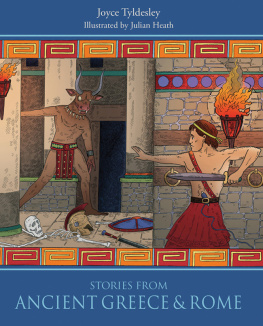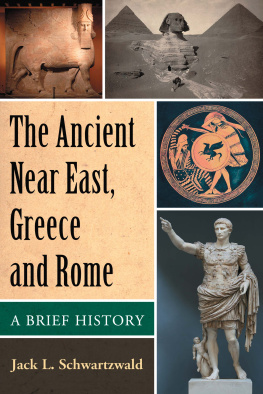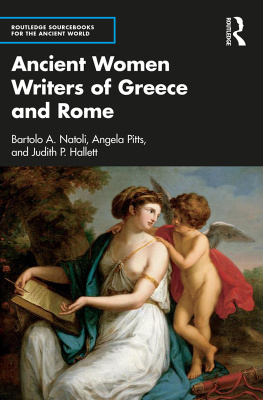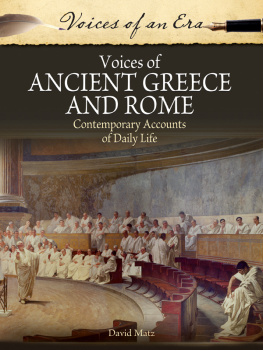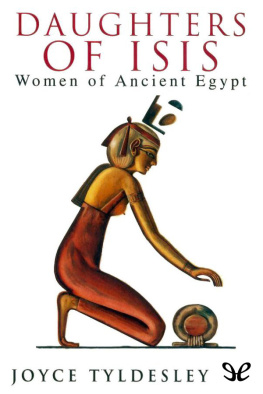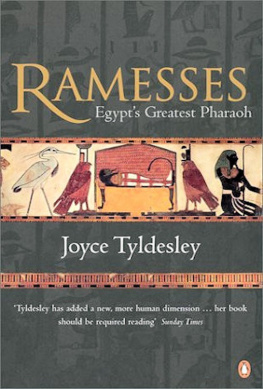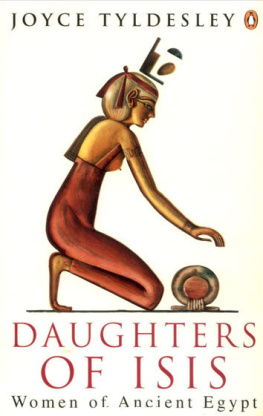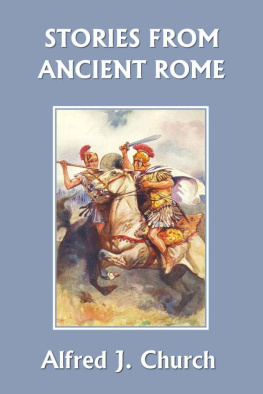STORIES FROM ANCIENT GREECE & ROME
by
Joyce Tyldesley
Illustrated by
Julian Heath
Published in the United Kingdom in 2017 by
OXBOW BOOKS
The Old Music Hall, 106108 Cowley Road, Oxford OX4 1JE
and in the United States by
OXBOW BOOKS
1950 Lawrence Road, Havertown, PA 19083
Oxbow Books, Joyce Tyldesley (text), and Julian Heath (illustrations) 2017
Paperback Edition: ISBN 978-1-78570-765-0
Digital Edition: ISBN 978-1-78570-766-7 (epub)
Mobi Edition: ISBN 978-1-78570-767-4 (mobi)
The moral rights of the author and illustrator have been asserted
All rights reserved. No part of this book may be reproduced or transmitted in any form or by any means, electronic or mechanical including photocopying, recording or by any information storage and retrieval system, without permission from the publisher in writing.
For a complete list of Oxbow titles, please contact:
| United Kingdom | United States of America |
| Oxbow Books | Oxbow Books |
| Telephone: (01865) 241249 | Telephone: (800) 791-9354, Fax: (610) 853-9146 |
| Email: | Email: |
| www.oxbowbooks.com | www.casemateacademic.com/oxbow |
Oxbow Books is part of the Casemate Group
The people of ancient Greece spoke the Greek language, but their version of the Greek language was not the same as the Greek language that is spoken in Greece today. If a modern Greek person travelled back in time to meet met an ancient Greek person, they would not be able to understand each other.
The ancient Greeks wrote their language using the ancient Greek alphabet. Can you write your own name in ancient Greek, in the scroll above? Not all of our letters occur in the Greek alphabet: they did not have the sounds J, Q, V and Y, so I have suggested some alternative letters for you. Remember to use the capital letter at the start of your name.
THE GREEK ALPHABET
| Normal letter | Capital letter |
| A | A |
| B | B |
| C | X |
| D |
| E | E |
| F |
| G |
| H |
| I | I |
| J | I |
| K | K |
| L |
| M | M |
| N | N |
| O | O |
| P |
| Q | K |
| R | P |
| S |
| T | T |
| U | Y |
| V |
| W |
| X |
| Y | I |
| Z | Z |
The people of ancient Rome did not write their numbers in the same way that we do. They used letters to represent the numbers. We call these letter-numbers Roman numerals . We sometimes use Roman numerals today; you may have seen them on a clock or watch face. Can you write your own age in the scroll, using Roman numerals?
ROMAN NUMERALS
ABOUT THIS BOOK
When I was a schoolgirl (a very long time ago; I am LVII years old!), I loved to read the stories told in ancient Greece and Rome. I think that you will love reading these stories too. So in this book I have collected together ten of the most exciting tales, and I have asked my friend Julian to draw pictures of the stories for you. You might want to colour these pictures in.
One of the stories, Romulus Builds a City , comes from ancient Rome. The other nine stories are slightly older; they are stories that were told in ancient Greece. All the stories are fiction this means that they have been made up. Some are stories that the people told to explain the things that puzzled them. Why are there different seasons every year? Why do bad things happen to good people? And why do all spiders create a web? But most are stories that were told simply for fun.
Happy reading!
I

This is a map of ancient Greece and Rome.
ABOUT ANCIENT GREECE AND ROME
Greece is a southern European country with a long coastline and thousands of islands scattered around the mainland in the Mediterranean Sea. Many hundreds of years ago, this land and its islands were divided into many small kingdoms or city-states. The people who lived in these city-states all spoke the ancient Greek language and all worshipped the same gods and goddesses, but each city-state had its own king and its own laws. Sometimes the city-states were friendly towards each other, and sometimes they fought fiercely against each other. The largest city-states were called Athens, Sparta, Thebes and Corinth.
The ancient Romans lived slightly later than the ancient Greeks, in the European country that we now call Italy. They worshipped the same gods and goddesses as the Greeks and told many of the same stories about them. However, they gave the gods and goddesses different names. So, Zeus the king of the gods in ancient Greece, was known as Jupiter the king of the gods in ancient Rome. The wise Greek goddess Athena became the wise Roman Minerva, and Aphrodite the ancient Greek goddess of love, was known as Venus in Rome.
PERSEPHONE VISITS THE UNDERWORLD
The goddess Demeter worked very hard every day. It was her job to make sure that the people of Greece always had enough food to eat. She made the crops grow in the fields, the fruit ripen on the trees and the flowers bloom in the gardens. She taught the farmers how to plough the fields, and how to scatter seeds on the land. When the grain and the vegetables and the fruit had grown, she taught the farmers how to collect the plentiful harvest, and how to store it safely in their barns. Thanks to Demeters hard work, the people of Greece never went hungry.
Demeter had just one child: a beautiful daughter, named Persephone. Persephone was as good and kind and cheerful as she was beautiful. She was a happy girl, who loved to sing and play in the warm sunlight while her mother was busy helping the people to grow their food. Everyone loved Persephone, but Demeter loved her most of all.
One sunny day, Persephone was singing and picking pretty flowers in the green meadow when Hades drove by in a golden chariot pulled by four fierce black horses. Instantly, Hades fell head over heels in love with the beautiful Persephone. He wanted her to be his wife, and to live with him forever. But Hades was no ordinary man. He was the god-king of the Underworld; the dark and cold land where the dead live as ghosts. The sun never shone in the Underworld. There were no green meadows, and no pretty flowers to pick. Hades knew that Demeter would never allow him to marry Persephone and take her to live in the gloomy Underworld, away from the warmth and sunlight that she loved. And so he decided not to tell Demeter what he was going to do. He simply reached down and dragged Persephone, kicking and screaming, into his chariot. Ignoring the girls terrified screams, Hades drove as fast as he could away from the green meadow.

